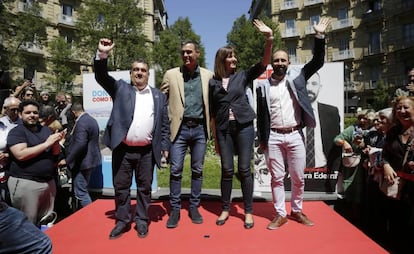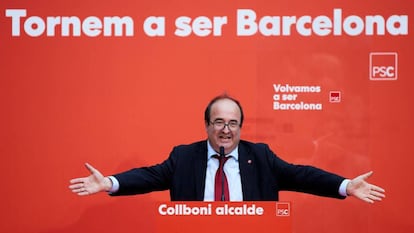Spain’s PM to Catalan separatists: Blocking Senate choice is to block spirit of dialogue
Basque nationalists also express puzzlement at decision by independence parties to veto Catalan Socialist Party’s Miquel Iceta as speaker of the upper house

Spain’s acting prime minister, Pedro Sánchez, on Wednesday told Catalan separatists that their decision to block the designation of a veteran Socialist politician as a regional senator is “a veto on social harmony, mutual understanding and dialogue.”
The refusal by the three separatist parties to vote for Miquel Iceta, leader of the Catalan Socialists (PSC), shows that the Catalan Republican Left (ERC), Together for Catalonia (JxC) and the Popular Unity Candidacy (CUP) “are afraid of solutions,” said Sánchez.
They are trying to gag us and tie our hands behind our backs
ERC official Pere Aragonès
Getting Iceta appointed as regional senator in the Catalan parliament is a necessary step to making him the speaker of the Spanish Senate, something that Sánchez wants to do after his Socialist Party (PSOE) won the general election of April 28.
“They’re afraid of telling the people who believed in them that independence is not going to be possible, and that the only alternative is through the Constitution and the Catalan Statute [regional charter of rights], which is what the PSOE defends,” said the acting PM at a campaign event in the Basque city of San Sebastián. Spaniards will go to the polls again on May 26 to vote in local, regional and European elections.
“This political term is going to be one of social harmony, even if it upsets the ‘three rights’ and the Catalan secessionists,” said Sánchez, alluding to the right-of-center Popular Party (PP) and Ciudadanos and the far-right Vox. The first two defend a new suspension of Catalan self-rule, while Vox wants to recentralize Spain and eliminate regional powers altogether.

Basque puzzlement
The president of the Basque Nationalist Party (PNV), Andoni Ortuzar, also asked the Catalan separatist parties to reconsider their decision. “I am a nationalist, I understand Catalan pro-sovereignty parties and I have a very good relationship with them, but I don’t understand this decision they have made,” said Ortuzar in an interview on the state radio station RNE. “I can only construe this as based on past history, on the problems and grievances they’ve had with constitutionalist forces at other times.”
“Iceta could make the Senate forget about 155,” said Ortuzar, alluding to the constitutional article that triggered the temporary suspension of self-rule in Catalonia following the unilateral independence declaration. The Spanish Senate has the final word on approving this measure, and the PP conservatives had an absolute majority in the upper house when it greenlighted Article 155 on October 27, 2017. The PSOE now has the most senators: 121 out of 208.
TV debate
Leaders of the separatist party ERC were particularly upset by the decision made on Tuesday by election authorities to prevent their leader Oriol Junqueras from participating in a televised debate ahead of the European elections. Junqueras is in preventive custody while the Supreme Court tries him and other secessionist leaders for rebellion, and election officials claimed that the late-night debate clashed with prison schedules.
A symbolic choice
The choice of Iceta as Senate speaker was symbolic, as he is a figure who has always supported dialogue as a means to solve the differences between Barcelona and Madrid. While his party does not support the idea of a negotiated referendum on independence, Iceta has in the past suggested he would support government pardons if the independence leaders currently on trial at the Supreme Court end up with jail sentences.
The party did not hesitate to blame the central government for the decision. “The acting Interior Ministry is seeking to silence Junqueras and prevent him from participating in election events and debates. They are trying to gag us and tie our hands behind our backs,” said party official Pere Aragonès.
For now, Iceta can only count on support from his own PSC and the leftist alliance of Podemos-Catalunya en Comú, which adds up to 25 seats. Albert Rivera, the head of the unionist party Ciudadanos, said he will “not block the designation,” but did not reveal whether he would vote for Iceta or abstain.
English version by Susana Urra.
Tu suscripción se está usando en otro dispositivo
¿Quieres añadir otro usuario a tu suscripción?
Si continúas leyendo en este dispositivo, no se podrá leer en el otro.
FlechaTu suscripción se está usando en otro dispositivo y solo puedes acceder a EL PAÍS desde un dispositivo a la vez.
Si quieres compartir tu cuenta, cambia tu suscripción a la modalidad Premium, así podrás añadir otro usuario. Cada uno accederá con su propia cuenta de email, lo que os permitirá personalizar vuestra experiencia en EL PAÍS.
¿Tienes una suscripción de empresa? Accede aquí para contratar más cuentas.
En el caso de no saber quién está usando tu cuenta, te recomendamos cambiar tu contraseña aquí.
Si decides continuar compartiendo tu cuenta, este mensaje se mostrará en tu dispositivo y en el de la otra persona que está usando tu cuenta de forma indefinida, afectando a tu experiencia de lectura. Puedes consultar aquí los términos y condiciones de la suscripción digital.








































